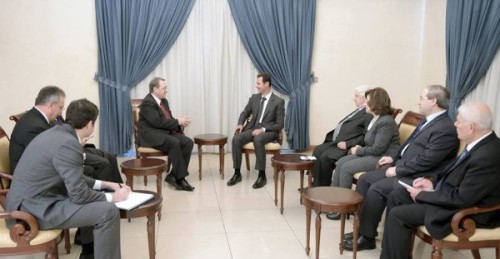PHOTO: Russian Deputy Foreign Minister Mikhail Bogdanov with President Assad, December 2014
UPDATE 2100 GMT: As the Russian initiative for “peace” talks collapsed, US Secretary of State John Kerry was supporting it in Geneva.
“We hope that the Russian efforts could be helpful,” Kerry said at the start of a meeting with UN envoy Staffan de Mistura.
Kerry said that he hoped de Mistura’s attempts to negotiate local cease-fires in Syria, starting with the divided city of Aleppo, “can have effect”.
And the Secretary of State pulled back from his previous calls for the departure of President Assad from power:
“It is time for President Assad, the Assad regime, to put their people first, and to think about the consequences of their actions, which are attracting more and more terrorists to Syria, basically because of their efforts to remove Assad.
UPDATE 1515 GMT: Russian Foreign Minister Sergei Lavrov has tried to save the political talks with a warning to Syrian opposition groups whom Russia wants to attend.
Lavrov said at a news conference on Wednesday, “Those who decide not to take part in this event, they will lose in terms of their positions in the peace talks process as a whole.”
Implicitly acknowledging difficulties in its high-profile initiative, Russia has pulled back from a declaration of political talks in Moscow at the end of January between Syria’s regime and a nominal opposition.
The Russians have said since last month that the talks will be held in pursuit of reconciliation, but the effort suffered a blow last week when Moaz al-Khatib, the former head of the Syrian National Coalition, said he would not attend as he saw no prospect for advance.
On Wednesday, a “Russian diplomatic source” told Interfax said there “might” be talks between January 26 and 29 but added that no date has been set.
The source said discussion on how the talks will develops is “still premature”.
Deputy Foreign Minister Mikhail Bogdanov has proposed 20 to 25 people representing the opposition inside Syria — but not groups based outside the country, such as the Coalition — coming to Moscow to discuss the political situation and ideas for resolution. Representatives of the regime would then join the talks.
Last month Bogdanov visited Damascus and met President Assad, and some members of the domestic opposition travelled to Russia. However, the steps were dented by the detention of leading members of the largest opposition group inside Syria, the National Coordinating Body for Democratic Change in Syria.
The domestic opposition is now reportedly demanding the release of detainees before further pursuit of the political discussions.

